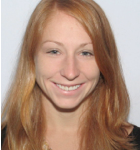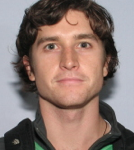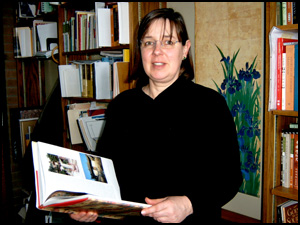Uncategorized
AST Director Prof. Goodman named a fellow of the Institute for Advanced Study
UO history professor and Asian Studies Program Director, Bryna Goodman, will spend six months at the Institute for Advanced Study in Princeton, New Jersey, after being awarded a prestigious fellowship at the research campus.
Goodman, who studies modern Chinese history and is director of the Asian Studies Program, will be at the institute from January until July. Read the article on Around the O!
http://around.uoregon.edu/
Current Students
Avi Conant
Avi Conant graduated from Whitman College with a degree in Politics. He has lived and taught abroad in China. He is currently researching food in China.
Contact Info: aconant@uoregon.edu
————————————————————————————————————-
Julie DePaulo
Julie DePaulo graduated from Ohio University in 2006 with a degree in World Religions. She was a Fulbright Fellow to Japan and remained there for over three years teaching English. Julie is currently finishing her MA focusing on the Japanese ritual of mizuko kuyo and digital media.
Contact info: jdepaulo@uoregon.edu
————————————————————————————————————-
Sara Menton
Sara Menton graduated from Birmingham-Southern College in 2012 with a degree in History. She studies Chinese and is interested in Chinese Art History.
Contact Info: smenton@uoregon.edu
————————————————————————————————————
Jesse Rodenbiker
Jesse Rodenbiker graduated from the University of Notre Dame with a B.A. in Philosophy. His recent research through the University of Oregon’s Asian Studies M.A. Program broadly focuses on issues of China’s urban sustainability, eco-city development, culture, land-use, landscape aesthetics, urban form, and human-environment relationships. His work engages Chinese language urban planning discourses, urban-geographic analysis, and anthropological methods. In addition, Jesse currently works with the Sustainable Cities Initiative’s China programs and is a graduate teaching fellow in the History department. After completing his M.A. studies at the University of Oregon, he will pursue a Ph.D. at the University of California, Berkeley in the field of Geography.
Contact info: jgr@uoregon.edu
————————————————————————————————————-
Eric Tojimbara
Eric Tojimbara completed his undergraduate studies at the University of Oregon in 2008 and returned as a Post-Bacceaulaureate in 2009. He majored in English, philosophy, and religious studies.
Currently he is in his final term as a M.A. student in Asian Studies focusing on Japan with his research specialization in Medieval Japanese religion and vernacular literature. His thesis, tentatively titled “Re-Presenting the Chigo: The Figure of the Acolyte in Medieval Japanese Buddhist Literature,” focuses on the Chigo Monogatari (acolyte tales) tradition. In the fall of 2013 Eric will begin his Ph.D at UCLA in the Asian Languages and Civilizations department.
Contact Info: ytojimbara@uoregon.edu
————————————————————————————————————-
Rachel Wallner
In 2011, Rachel Wallner applied and was awarded a scholarship to pursue Chinese language study at Sichuan University in Chengdu, China. Rachel spent 2011-12 developing her language skills abroad. In 2012, she applied for and won another full-year scholarship and a second year of leave from the UO, so she can complete her second and final year at Sichuan University. She will return to the University of Oregon in fall 2013 to complete her degree in Asian Studies, and equipped with advanced language skills and an improved understanding of Chinese culture and society. She hopes to make unique and significant contributions to Chinese social history as she intends to pursue a Ph.D. after graduating from the Asian Studies master’s program.
Contact info: rwallner@uoregon.edu
Alumni
Sara Menton – MA Winter 2014
Sara Menton graduated with a Master’s degree in Asian Studies Winter 2014. Sara entered the Asian Studies master’s program in Fall 2012. She focused on Chinese painter Zhang Daqian. Her thesis: “Authenticity and the Copy: Analyziing Western Connoisseurship Chinese Painting Through the Works of Zhang Daqian.” Sara’s thesis committee: Jenny Lin (History of Art and Architecture), Albert Narath, (History of Art and Architecture), and Daniel Buck (Asian Studies). Currently, Sara is working on her law degree at the University of Miami in Florida.
Julie DePaulo – MA Spring 2013
Julie DePaulo graduated Magna Cum Laude from Ohio University with a B.A. in World Religions. She entered the Asian Studies M.A. program in Fall 2011 and graduated in spring 2013. Her thesis, “Mizuko Kuyō Online: Digital Media and Religious Ritual in Contemporary Japan” shows how individuals now actively participate in dialogues about misuko kuyō online and how this affects its cultural practice. Her thesis explores the shift from a temple dominated religious practice to a more secular ritual. Julie’s thesis committee: Chair Alisa Freedman (East Asian Languages and Literatures (EALL), Committee members Daniel Buck (Asian Studies) and Jason Webb (EALL). Julie is currently exploring employment opportunities.
Jesse Rodenbiker – MA Spring 2013 Jesse is currently a Ph.D. student in Geography at UC Berkeley. He’s involved in the Sustainable Cities Initiative – China Programs. Click here for more.
Jing Pei Goh – MA Spring 2012
Jing Pei Goh came to the University of Oregon Asian Studies program as a Fulbright Fellow from Malaysia. Her M.A. thesis presented an interdisciplinary study on identity politics of Malaysian Chinese education. She is currently serving Teach For Malaysia, the Malaysian partner of the Teach For All global network. Previously, she graduated from University of Malaya and worked for a boutique human capital consulting firm. Combining her interest in talent development and education, Jing Pei also works on a social venture focusing on talent development space in Southeast Asia.
Matthew Hayes – MA Spring 2012
Matthew Hayes graduated from the University of Oregon with a B.A. in Religious Studies and returned for his M.A. in Asian Studies. His thesis presented geographical and social movement as possible forms of physical, cognitive, or even spiritual release from the strictures of Tokugawa society, an argument illuminated by the theoretical models of Pierre Bourdieu, Victor Turner, and Catherine Bell. He is currently pursuing a Ph.D. in Buddhist Studies in the Department of Asian Languages and Cultures at UCLA. He plans to continue his study of the treatment of ritual amidst social change in early modern Japan.
Support Asian Studies
Supporting the Asian Studies Program
The Asian Studies Program depends on gifts from our alumni and friends to help us provide the kind of education Oregon’s students need to face the world of the twenty-first century. If you’d like to help, one good way to support us is to make a donation to the Asian Studies Program general fund. To make a contribution online, you can click on this link to go directly to the University of Oregon Foundation’s secure website:
Support the Asian Studies Program by donation through the UO Foundation
UO Asian Info
Other Asia Related Resources at the University of Oregon
Confucius Institute for Global China Studies
The Yamada Language Center
Center for Applied Second Language Studies
Office of International Affairs
The East Asia Collection at the Knight Library
Center for Asian and Pacific Studies
Events
Put Events here
Ina Asim
Office: 317 McKenzie Hall
Phone: (541)346-6161
Email: inaasim@uorgeon.edu
Biographical information:
Associate Professor, Pre-Modern Chinese History
M.A. 1982 Wuerzburg University Germany, Sinology, Japanology, German Literature
1985 Linguistic Information- and Textprocessing
Dr. phil. 1992 Wuerzburg University, Sinology, Japanology, German Literature
Dr. phil.habil. 2002 Wuerzburg University, Venia Legendi for Sinology
With the U of O since 2002
Major Publications
Authored Works
Kluge Gattin, gute Mutter – oder Revolutionärin? Frauen und Frauenbildung in Vorstellungen und Biographien chinesischer Reformer des frühen 20. Jahrhunderts. (2002);
Religiöse Landverträge aus der Song-Zeit.. (Religious Land Contracts from the Song Dynasty). (1993).
In preparation for print
‘Coiling Dragon,Crouching Tiger’. Urban Life in Late Ming Nanjing.
Book publication “edited in cooperation with “Beamtentum und Wirtschaftspolitik in der Song-Dynastie (Officialdom
and Economic Politics in the Song-Dynasty), hg. von Dieter Kuhn unter Mitarbeit von Ina Asim. (1995).
Research Articles
“Antiquarianism”. Istituto della Enciclopedia Italiana. Storia della Scienza. Vol. III Le Scienze
Extraeuropee. Sez. A. Science in China. [Encyclopedia of the history of science. History of Science in China.] (2002).
“The Merchant Wang Zhen (1525-1593)”. ( Kenneth J. Hammond, [ed.] The Human Tradition in Premodern China.
(2002).
“Decline of a Well- Ordered World: What Happened to Sartorial Regulations at the End of the Ming”. Denise Gimpel and Melanie Hanz (eds.),
Cheng – In All Sincerity. Festschrift in Honor of Monika Uebelhoer. (2002). Aspects of the Perception of Zhou Ideals in the Song Dynasty
(960-1279)” (2001).
“Weise Mutter, gute Gattin – oder Revolutionärin? Frauen in Biographie und Gedankenwelt des Reformers Cai Yuanpei (1868-1940)”. (“Wise Mother, Good Wife – or Revolutionary? Women in the Biography and in the Thoughts
of Cai Yuanpei (1868-1940”)). (1999).
“Status Symbol and Insurance Policy: Song Land Deeds for the Afterlife.” (1994).
“Die aristokratische Grabkultur des 7. und 8. Jahrhunderts” (“Aristocratic Tomb Culture in the 7th and 8th Centuries”) (1993).
Report on Graduate Applicant
Instructions to Applicant: Please complete the information requested below and give this form to an appropriate person who is familiar with your educational background and abilities. Please type or print:
Name of Applicant:
(First)________________ (M)__________ (Last)__________________
Applying for:
Admission ____________________________________________
Graduate Award _______________________________________
Department ___________________________________________
Degree Objective ______________________________________
Under the Federal law entitled the Family Educational Rights and Privacy Act of 1974 and the University of Oregon Student Record Policy, registered students are given the right to inspect their records, including letters of recommendation. Opinion is divided whether letters open to review are more helpful in assessing a student’s potential than those which are not. Should you wish to waive your right to this evaluation, you may do so by signing the waiver below. In any case all evaluation will be carefully considered.
I expressly waive any rights I might have to access to this recommendation under the Family Educational Rights and Privacy Act of 1974, the University of Oregon Record Policy, or any other law, regulation or policy. I understand that the University of Oregon does not require me to execute this waiver and is willing to review my application whether or not I sign it.
Date:____________ Signature:______________________________
To Person Making Evaluation: As required by the Family Educational Rights and Privacy Act of 1974 and the University of Oregon Student Record Policy, a student may either elect to waive or not to waive the privilege of viewing this recommendation form. If the student has not signed the above waiver you should consider this form to be non-confidential.
We do request that you use this form on the next page for your recommendation and return it directly to the department named above. If you need room for additional comments please feel free to attach an additional page.
Master’s Degree Requirements
Students pursuing an M.A. in Asian Studies must complete 48 credits of graduate study, including at least 44 in Asia-related courses. Graduate credit for language study may only be earned for work beyond the third-year level.
- Of the 44 credits, at least 12 must be earned in seminars or colloquia, including Perspectives on Asian Studies (ASIA 611) and Issues in Asian Studies (ASIA 612), which should be taken during the first year of study
- To ensure interdisciplinary breadth, students must complete at least two courses in each of the following areas
- Humanities – course in Architecture, Art History, Literature, Music, Religious Studies
- Social sciences – courses in Anthropology, Economics, Geography, International Studies, Political Science
- History ( in an area different from the focus area)
- To ensure a cross-regional awareness, at least 8 credits of the 44 must be in courses about a culture or civilization other than the student’s primary language and civilization focus.
- At least 9 of the 44 credits are earned in Thesis (ASIA 503). In unusual circumstances, students may petition to the program committee to waive the thesis requirement for the degree. If the waiver is granted, the student is expected to complete 56 graduate course credits (of which at least 44 are Asia related), submit two substantial research papers on Asian topics developed in seminars or colloquia, and pass a general Asian studies field examination.
The MA candidate is required to demonstrate competence in an approved Asian language equivalent to at least three years of college training. The language requirement is a critical part of the program and must be planned from the outset of graduate work, particularly if the student has no training in an Asian language. Languages offered at the University of Oregon are Chinese, Japanese, and Korean. Graduate credit for language courses is earned only for work beyond the third year of language study.
Students should also review the graduate School’s regulations for information on the University’s general master of arts degree requirements. Asian Studies Courses (ASIA)
399 Special Studies: [Topic] (1-5R)
401 Research: [Topic] (1-5R)
405 Reading and Conference: [Topic] (1-6R)
407/507 Seminar; [Topic] (1-5R)
410/510 Experimental Course:(1-5R)
503 Thesis (1-9R) P/N only
601 Research: [Topic](1-6R) P/N only
605 Reading and Conference: [Topic] (1-6R)
607 Seminar; [Topic] (1-5R)
611 Perspectives on Asian Studies:[Topic](1)
Explores the diverse perspectives that define Asian studies. Samples conflicts, controversies, and areas of consensus that characterize the field. Prereq: instructor’s consent
612 Issues in Asian Studies: [Topic]( 3R)
Selected Asian studies issues. Prereq; instructor’s consent. R once when topic changes for maximum of 6 credits.
Checklist for Submission of Application Documents
TO BE SENT TO THE ASIAN STUDIES OFFICE:
- ___ Statement of Objectives*
- ___ A writing sample (a research paper or essay written in English, including citations, on an Asia-related topic)
- TEST SCORES
- ___GRE (U.S. Students)
- ___ TOEFL (Foreign Students) Minimum score–575
- ___ Letters of Reference (3)
(You may print the “Report on Graduate Applicant” forms) - ___ Official transcripts from all institutions attended
- ___ Application for Graduate Award** (GTF) [Optional]
- ___ Chinese language tape** if applying for GTF in Chinese
- ___ Japanese language tape** if non-native speaker applying for GTF in Japanese
- TO BE SENT TO THE OFFICE OF ADMISSIONS:
- ___ Application for Graduate Admission (top copy of form)
- ___ Application fee ($50.00). This cannot be waived.
- ___ Transcript showing degree conferral
It is the candidate’s responsibility to ensure that these documents have been received by the Asian Studies Program and the Office of Admissions as indicated. Instructions are also printed on the back side of the Application for Graduate Admission. Additional items, such as financial statement for foreign students, may also be required.
* A page of statement of your interest in Asian Studies and your goals/career objectives is required. This statement provides a useful opportunity for the candidate to speak and offers the selection committee information not covered by the formal application.
** Graduate Teaching Fellowships are awarded once a year, in the spring, for the following academic year (September through June). If you are applying for a GTF, your application must be completed by February 15. The Asian Studies Program currently awards four .22 FTE GTF positions each year. Applicants for Chinese GTF’s much send a cassette tape with their application as explained on the list of criteria for awards. Those applying for language instruction GTF’s in Japanese must send a cassette tape if they are not native speakers. This requirement cannot be waived. Occasionally, one (or possibly more) of the five GTF positions is/are filled as a non-language position and is/are assigned to assist a professor or professors is an Asian related class.
A quarter time salary does not cover the total expense of living and study at the University of Oregon. Foreign recipients of these awards may need to provide documentation of sufficient additional resources in order to obtain a visa.










